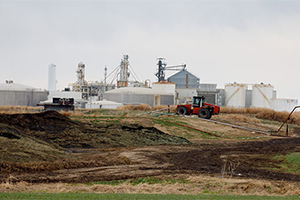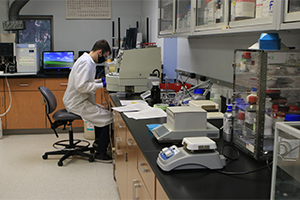Researchers Explore Potential AltEn Ethanol Plant Contamination Effects on Local Residents

After ethanol processing plant AltEn opened in 2015, residents of nearby Mead, Nebraska, noticed odors coming from the plant’s byproducts. The problem continued over the years, until 2021 when Nebraska lawmakers moved to regulate what emerged as the problem: seed treated with pesticides. DWFI is supporting the University of Nebraska Medical Center (UNMC) and University of Nebraska–Lincoln (UNL) research to help stakeholders understand this situation, monitor pesticide levels in the area and study associated human and animal health threats.
The problem came to researchers’ attention in a couple of different ways. Judy Wu-Smart, Ph.D., UNL entomologist, noticed bee colonies she was trying to establish in the area were dying. Her investigation revealed substantially high levels of pesticide, eventually confirming AltEn residue as the source. Jesse Bell, Ph.D., DWFI director of water, climate and health and Claire M. Hubbard professor of health and environment at UNMC, became aware of the problem when a colleague sent him a newspaper article about it. Bell forwarded the article to UNMC and UNL colleagues, including Shannon Bartelt-Hunt in UNL’s Civil and Environmental Engineering Department, who now leads the research with Bell.
The Nebraska Department of Environment and Energy (NDEE) collected initial samples from the plant’s lagoons and stored solids. Two pesticides in the lagoon, clothianidin and thiamethoxam, were at 58,400 ppb and 85,100 ppb levels, respectively. The EPA benchmark for aquatic life is 11 ppb and 17 ppb, respectively. Solid waste residue was measured at 554,000 ppb. These are very concerning concentrations, especially considering the plant sold solid waste to farmers as fertilizer and about 4 million gallons of contaminated water accidentally leaked from a tank into the local waterway.

This project helps demonstrate the ability of the University and DWFI to convene expert teams to help Nebraskans, from local residents to lawmakers, understand issues and find solutions. The team continues to monitor and evaluate the situation and is seeking additional funding to ensure area residents can access effective remediation resources.
Related Articles
Impact of Covid-19 on Midwest Agtech Entrepreneurship
Solving complex modern irrigation- and water-related problems requires combining the knowledge and expertise of a wide variety of specialists.
Nebraska Nitrate Working Groups Tackle Persistent Drinking Water Contamination
Over the past four decades, partners across Nebraska have worked to address rising nitrate levels, and while improvements have been made, levels continue to worsen across large portions of the state.
Hub Brings Together Faculty for Greater Impact in Water and Cropping Systems
Solving complex modern irrigation- and water-related problems requires combining the knowledge and expertise of a wide variety of specialists.
ANNUAL REPORT 2021
- Overview
- Letter from the Executive Director
-
Research and Projects
-
Global and National
- DWFI Leads Smallholder Sustainable Irrigation Entrepreneurship Project in Sub-Saharan Africa
- New Agricultural Water Economics Team Advances Water Policy
- Small Rwandan Agribusiness Entrepreneurs Work in New Ways Following COVID-19 Restrictions
- Future Farming: Integrated Water Management Leads to Profitability and Sustainability
- Modeling Brazilian Aquifer Will Help Farmers Maximize Crop Water Productivity
- DWFI experts contribute to FAOs State of Food and Agriculture 2020
-
Nebraska
- Hub Brings Together Faculty for Greater Impact in Water and Cropping Systems
- Researchers Explore Potential AltEn Ethanol Plant Contamination Effects on Local Residents
- Impact of Covid-19 on Midwest Agtech Entrepreneurship
- Nebraska Nitrate Working Groups Tackle Persistent Drinking Water Contamination
- Nebraska Smart Farms Drive Technology Adoption
-
Faculty Fellows and Supported Students
- DWFI Welcomes Eight New Faculty Fellows
- DWFI Funds Research of 10 New Students in Food and Water Security
- Water for Food Student Impact Workshop and Research Forum
- Investigating Climate’s Influence on Atrazine Groundwater Contamination
- Sustainable Water Management: Solving the Mystery of Nebraska’s Intricate Aquifer System
- Drones Provide Detailed Picture of Wetland Health
- Understanding Corn Ear Abnormalities to Close Yield Gaps
- Examining the Effects of Agrichemical Contaminants on Pediatric Cancers
-
Global and National
-
Education
- Virtual Webinar Series Attracts Various Audiences
- One Health Webinar Series Discusses Health and Well-being of Humans Animals and the Environment
- Water and Health Summit Brings Together Leaders to Clarify Issues in Nebraska, Define Solutions
- NWC Hosts Virtual Mini-Conference
- Policy Team Leads Student Course on Securing and Sustaining Water for Food Globally
- Plans for Water for Food Global Forum Underway
- Regional Event Localizes Findings of the 2020 Lancet Countdown Report
- Communication
- Development and Organizational Sustainability
- Resources
- Search
ANNUAL REPORT 2021
- Overview
- Letter from the Executive Director
-
Research and Projects
-
Global and National
- DWFI Leads Smallholder Sustainable Irrigation Entrepreneurship Project in Sub-Saharan Africa
- New Agricultural Water Economics Team Advances Water Policy
- Small Rwandan Agribusiness Entrepreneurs Work in New Ways Following COVID-19 Restrictions
- Future Farming: Integrated Water Management Leads to Profitability and Sustainability
- Modeling Brazilian Aquifer Will Help Farmers Maximize Crop Water Productivity
- DWFI experts contribute to FAOs State of Food and Agriculture 2020
-
Nebraska
- Hub Brings Together Faculty for Greater Impact in Water and Cropping Systems
- Researchers Explore Potential AltEn Ethanol Plant Contamination Effects on Local Residents
- Impact of Covid-19 on Midwest Agtech Entrepreneurship
- Nebraska Nitrate Working Groups Tackle Persistent Drinking Water Contamination
- Nebraska Smart Farms Drive Technology Adoption
-
Faculty Fellows and Supported Students
- DWFI Welcomes Eight New Faculty Fellows
- DWFI Funds Research of 10 New Students in Food and Water Security
- Water for Food Student Impact Workshop and Research Forum
- Investigating Climate’s Influence on Atrazine Groundwater Contamination
- Sustainable Water Management: Solving the Mystery of Nebraska’s Intricate Aquifer System
- Drones Provide Detailed Picture of Wetland Health
- Understanding Corn Ear Abnormalities to Close Yield Gaps
- Examining the Effects of Agrichemical Contaminants on Pediatric Cancers
-
Global and National
-
Education
- Virtual Webinar Series Attracts Various Audiences
- One Health Webinar Series Discusses Health and Well-being of Humans Animals and the Environment
- Water and Health Summit Brings Together Leaders to Clarify Issues in Nebraska, Define Solutions
- NWC Hosts Virtual Mini-Conference
- Policy Team Leads Student Course on Securing and Sustaining Water for Food Globally
- Plans for Water for Food Global Forum Underway
- Regional Event Localizes Findings of the 2020 Lancet Countdown Report
- Communication
- Development and Organizational Sustainability
- Resources
- Search
Search More Articles
Search the 2021 Annual Report for more articles.
COOKIE USAGE:
The University of Nebraska System uses cookies to give you the best online experience. By clicking "I Agree" and/or continuing to use this website without adjusting your browser settings, you accept the use of cookies.

